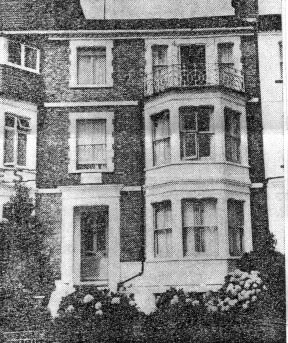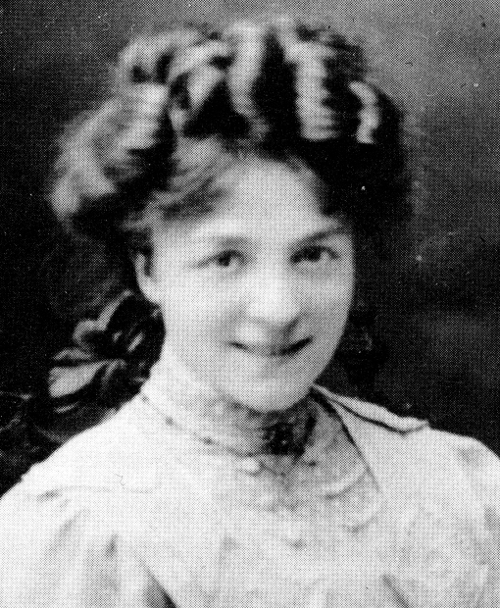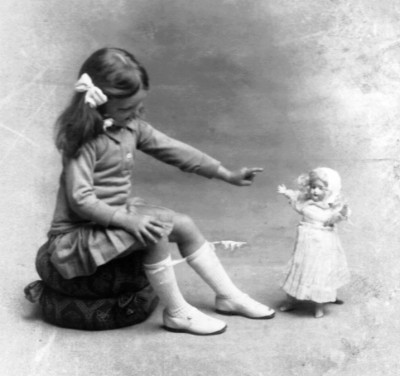Edith and the Mountaineer.

4 Cliff Town Parade
Edith Mary Lewin (born 1883) was the youngest surviving daughter of William and Amelia. In her early twenties she sometimes helped out her aunt, Louisa Wright, who lived at 4 Cliff Town Parade, Southend, Essex. Louisa let rooms and at this time her only tenant was an elderly gentleman - Edward Whymper.
Louisa was attractive and Whymper was unmarried and in need of an heir. Although there was more than forty years between them, Whymper proposed (subject to Edith undergoing an examination to establish her chastity) and, surprisingly perhaps, Edith accepted.

Edith Lewin
In his biography of Whymper, Ian Smith writes:
Whymper's marriage was a business arrangement and he may have had a typically obsessive and controlling view of Edith, but he wanted an heir, and was enticed by the fond hope of settled domestic tranquillity. He was, though, secretly proud of his success in capturing this beautiful young woman. [p.275]
The wedding took place on 25th April, 1906 at Emmanuel Church, Forest Gate. It did not go well. Whymper's nephew and best man, Robert Whymper found the
leery sermon about the beauty of youth administering to old age; 'too horrible for words - to me, at least, knowing the whole story behind the misalliance' [Smith: p.276].
Whymper's only two guests didn't warm to Edith's family either:
All the other guests to the 'ghastly wedding breakfast' were Edith's family who showed no restraint in consuming Whymper's Bouvier champagne. Too shy and highly strung to participate, Whymper sat drinking in a room on his own until Aylett and Robert Whymper dragged him downstairs, whereupon he became so objectionable that they bundled him back upstairs. Seeing much of the cutlery disappearing into the guests pockets ('they were a crew of crooks!' according to the best man), Aylett and Robert Whymper attempted to stand guard at the door, but soon gave this up to avoid fights, running up a large bill for Whymper. [Smith: p.277].
I find it hard to reconcile this account with my memory of some of those present (admittedly much later in their lives). Though they were a rung or two below Whymper on the social ladder their later lives show them to have been neither drunks nor crooks. They were intelligent, though self-educated; most were teetotalers and several became lay preachers. It is a shame that none of them left any account that might explain this uncharacteristic behaviour.
Whymper spent the next few weeks showing off his new bride to his family, friends and acquaintences. Poor Edith must have found the introductions intimidating - a whirlwind of severe relatives and dusty museum curators. I can just about imagine her taking tea with the Head of the Meteorological Department at the Greenwich Observatory but the thought of lunch at Windsor Castle (admittedly only with the Royal Librarian) conjures up visions of Shaw's Eliza Doolittle. Whymper's 'formidable' spinster sisters found Edith 'flighty, uneducated and interested only in fancy clothes'. She must have been dreadfully out of her depth.
At the end of June the couple travelled to Switzerland where Edith was introduced to Whymper's mountaineering friends. Edward gave her some climbing lessons but she does not appear to have taken to the sport.

Ethel Rosa Whymper
The couple's daughter, Ethel Rosa, was born on 14th May, 1908. Edward, who suffered from insomnia, found the child's constant crying annoying. He began to drink heavily and this led to disagreements with Edith. Early in 1909 she left him and applied for a separation order. A few weeks later she returned: partly, it seems, because Edward had reduced his drinking but mainly because he refused, point-blank, to pay any maintenence.
The marriage struggled on. Whymper was away in Canada and Switzerland for much of 1909. Shortly after his return the couple made a pleasant visit to Aldeburgh with Thomas Hardy who read Whymper his sonnet about the Matterhorn. The reconciliation was short lived though and, a couple of months after this visit Edith left Whymper for the last time. This time suing for divorce.
Broken by the failure of his marriage and the loss of his child and with his health worstening, Whymper travelled to Chamonix where he died on 16th September, 1911.
Edward's will made no provision for Edith or Ethel, leaving the residue of his estate to his brother, William. A member of the Whymper family recalled that William
was so upset by the exclusion of his brother's wife and daughter that he used half the residue of the will to set up trust funds for them. In the middle of this, prompted by her lawyer, Edith challenged the will in court, which utterly demoralized the well-meaning Bill [Smith: p.287]
This may well be true, as when the case came to court it was announced that a settlement had been reached between the parties.
For a while Edith and Ethel lived with William and Amelia in Leigh - they were there on census day, 1911. It is probably during this period that Ethel formed the attachment to her aunt Alice (known to the family as 'Duck') which lead to Ethel acquiring the nickname 'Chickie'.
Towards the end of 1913, Edith remarried. Her second husband was Cecil Victor Logan, an ex-soldier and the son of a tailor and outfitter who ran a shop in Eastbourne. They lived in Henslade near Taunton. Edith's second marriage was even shorter than her first, as she died from 'complications of pregnancy' on the 2nd April, 1914.